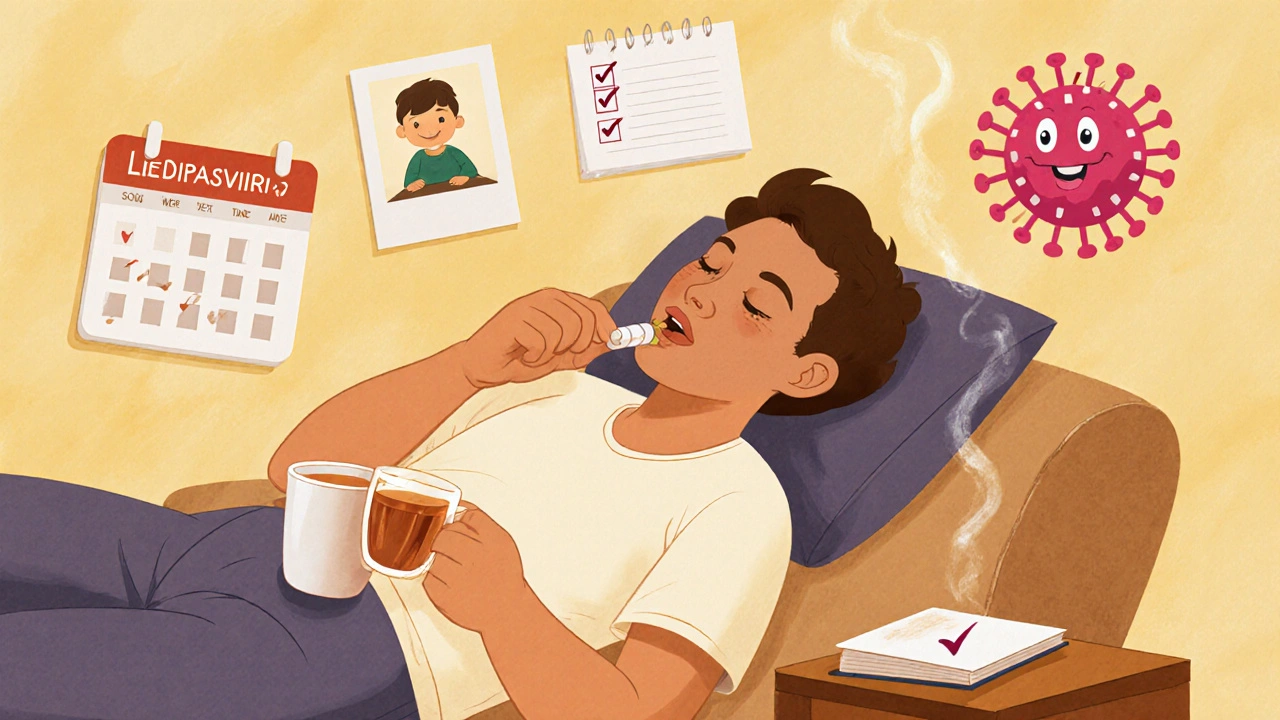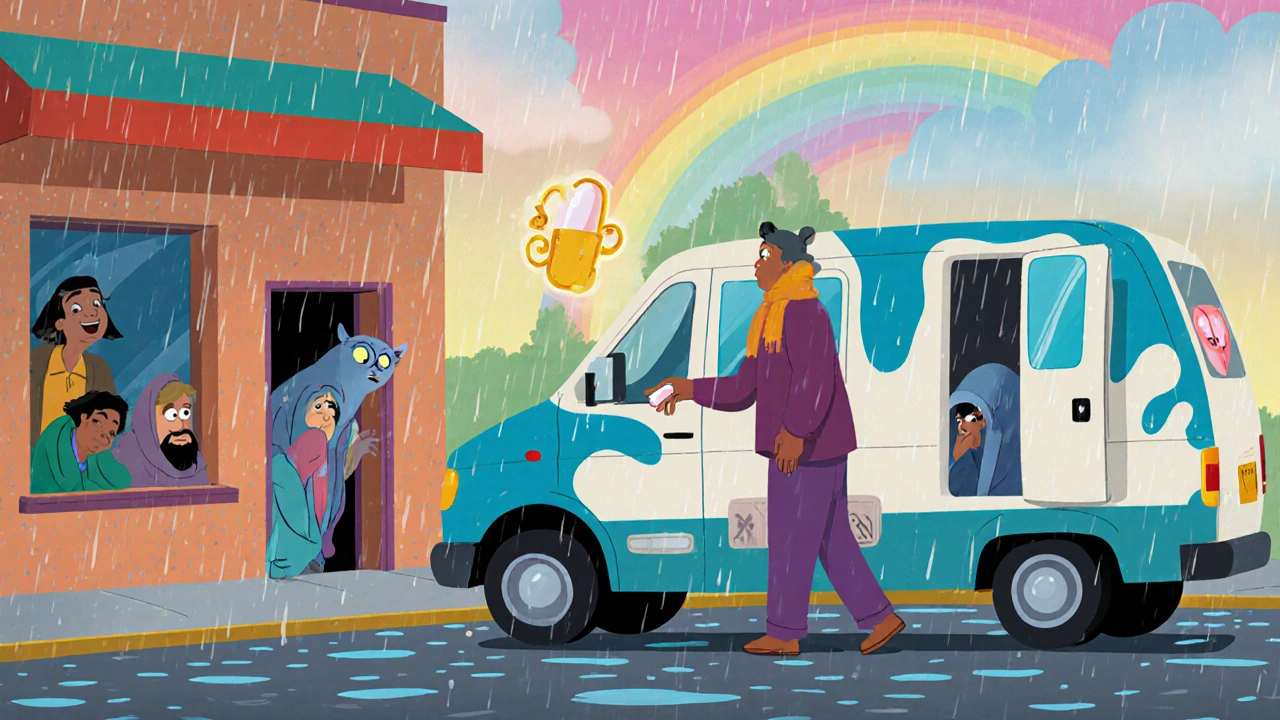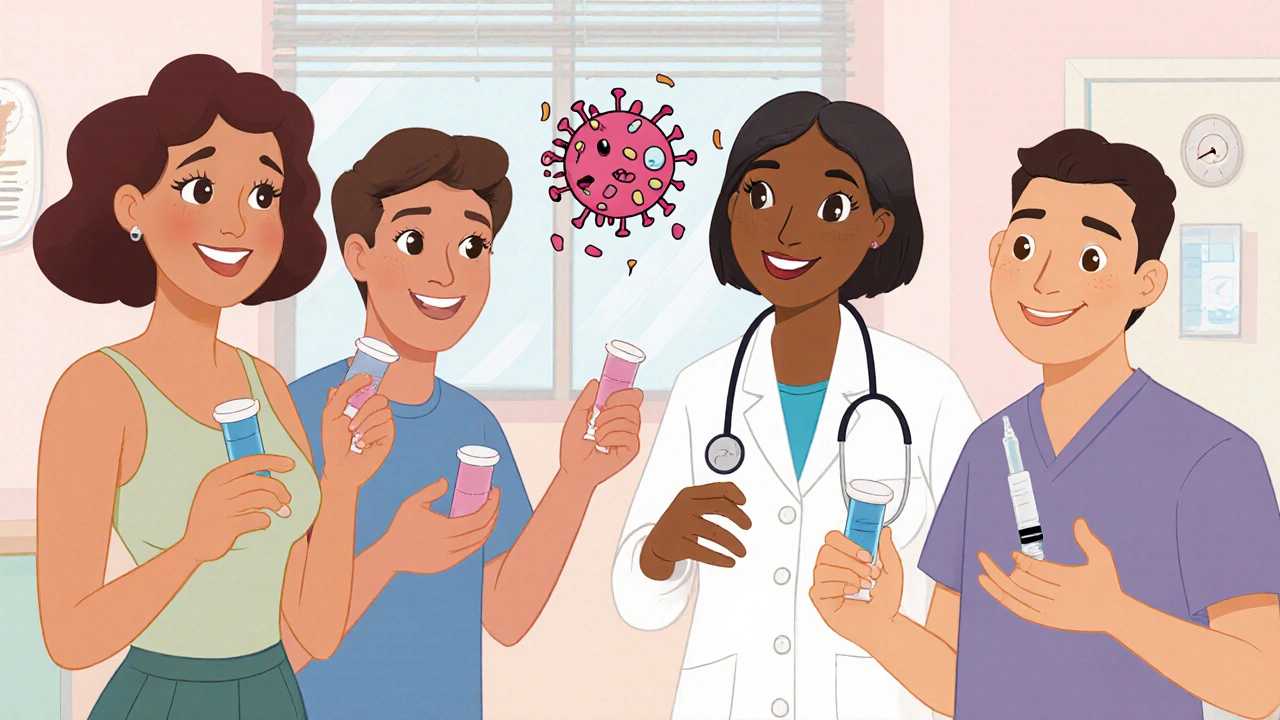If you’re living with hepatitis C and also struggling with substance use, you’re not alone-and treatment is still possible. Ledipasvir, part of the combination drug Harvoni, has changed the game for people with hepatitis C, especially those managing addiction. It’s not a cure-all, but for many, it’s the clearest path to clearing the virus from their body-even while in recovery.
What Ledipasvir Actually Does
Ledipasvir works by blocking a protein the hepatitis C virus needs to copy itself. It’s always paired with sofosbuvir, another antiviral, in a single pill called Harvoni. Together, they stop the virus from spreading in your liver. Unlike older treatments that required injections and caused severe side effects like depression and fatigue, ledipasvir-sofosbuvir is taken as one pill, once a day, for 8 to 12 weeks. Most people finish treatment with the virus undetectable in their blood.
Studies show that over 95% of people with genotype 1 hepatitis C-by far the most common type in the UK and US-clear the virus after 12 weeks of this combo. That’s true whether they’re actively using substances or in recovery. The key isn’t perfect compliance-it’s consistent enough dosing to keep drug levels high enough to crush the virus.
Why It Works Better for People with Substance Use Disorders
Old hepatitis C treatments, like interferon, were brutal. They made depression worse, caused insomnia, and triggered cravings. Many people with addiction dropped out because the treatment felt worse than the disease. Ledipasvir doesn’t do that. It doesn’t cross the blood-brain barrier in a way that affects mood or cognition. You won’t feel more anxious, more depressed, or more wired. That matters.
Research from the University of Edinburgh in 2023 followed 312 people with hepatitis C and opioid use disorder. Half were in methadone maintenance, half were in recovery. Both groups had the same cure rate: 96%. No dropouts due to side effects. No spikes in drug use linked to treatment. That’s huge. It means ledipasvir doesn’t interfere with recovery-it supports it.
What You Need to Take It
You don’t need to be sober to start ledipasvir. You don’t need to prove you’re "ready." You don’t need a clean urine screen. You don’t need to be off alcohol or opioids. Clinics in Leeds, Manchester, and Glasgow have been prescribing it to people still using heroin, cocaine, or benzodiazepines-and getting results.
What you do need:
- A confirmed diagnosis of hepatitis C (via RNA test, not just antibody)
- A liver assessment (FibroScan or blood test to check scarring)
- Access to a clinic that offers direct-acting antivirals (DAAs)
- A plan to take the pill daily
Many NHS clinics now offer directly observed therapy (DOT) for people who struggle with memory or routine. A nurse or peer worker watches you swallow the pill. No judgment. Just support. If you’re in a needle exchange, a homeless shelter, or a detox unit, ask if they can connect you to a DAA program.

Drug Interactions: What to Watch For
Ledipasvir isn’t safe with everything. Some drugs can make it less effective-or raise your risk of side effects. Here’s what to avoid:
- St. John’s Wort (used for low mood-it drops ledipasvir levels by 80%)
- Some HIV meds (like efavirenz or rifampin)
- Certain seizure drugs (carbamazepine, phenytoin)
- High-dose antacids or proton-pump inhibitors (take them 4 hours apart)
If you’re on methadone, buprenorphine, or naltrexone, you’re fine. No interaction. No dose change needed. Same with benzodiazepines, gabapentin, or even nicotine patches. The only red flag is if you’re taking multiple prescriptions without telling your doctor. Always list everything you’re using-even over-the-counter herbs or street drugs. They won’t judge. They just need to know what’s in your system.
Side Effects? Almost None
Most people feel nothing. A few report mild fatigue, headache, or nausea in the first week. These fade fast. Unlike interferon, you won’t lose your appetite, your hair, or your will to get out of bed. You can still work, care for kids, go to meetings, or go to the gym.
One rare but serious risk: reactivation of hepatitis B. If you’ve ever had hepatitis B-even if it’s been decades-the virus can wake up while you’re treating hepatitis C. That’s why every patient gets tested for hepatitis B surface antigen before starting ledipasvir. If it’s positive, you’ll get a second drug (like tenofovir) to prevent liver damage.
What Happens After You Finish?
Twelve weeks after your last pill, you’ll get a blood test. If the virus is gone, you’re cured. No more liver damage from HCV. No more risk of cirrhosis, liver cancer, or needing a transplant.
But curing hepatitis C doesn’t fix everything. If you’re still using substances, your liver can still get hurt from alcohol, acetaminophen, or fatty foods. You still need to protect it. You still need support. Many people find that clearing HCV gives them a new reason to stay in recovery. One patient in Bristol told his peer worker: "I didn’t want to die from a liver I couldn’t even look at. Now I want to live long enough to see my daughter graduate."

Where to Get Help in the UK
You don’t need a specialist to start ledipasvir. Your GP can prescribe it. But many people find it easier through:
- Community drug services (they often have hepatitis C nurses)
- Sexual health clinics (they test and treat HCV routinely)
- Homeless health teams
- Prison health services (yes, even if you’re incarcerated)
In Leeds, the Leeds Teaching Hospitals NHS Trust runs a dedicated HCV program for people with addiction. You can walk in without an appointment. No ID needed. No questions about your drug use. Just a blood test and a pill.
If you’re unsure where to start, call NHS 111 and ask for "hepatitis C treatment for people with substance use." They’ll connect you to the right service. You don’t have to figure this out alone.
Real Talk: It’s Not Perfect
Some people still miss doses. Life gets in the way. You might forget because you’re using, or because you’re in crisis, or because you’re scared. That’s okay. Missing one day won’t ruin your chances. Missing two or three? Talk to your provider. They can adjust the plan. Some people take 16 weeks instead of 12. Others get monitored more closely. There’s no shame in needing extra help.
And if you relapse? You don’t have to start over. You don’t have to wait. You don’t have to feel guilty. You can restart treatment. The virus doesn’t care about your past. It only cares if you take the pill.
Final Thought: You Deserve to Be Healed
Too many people with addiction are told they’re not "ready" for care. That they need to be clean first. That’s outdated. Ledipasvir proves you don’t need to be perfect to heal. You just need to be willing to take one pill a day. That’s it. The rest-recovery, stability, hope-it follows.
Clearing hepatitis C isn’t just about your liver. It’s about your future. It’s about being able to hold your child without fear. About working without shame. About knowing you’re not broken-you’re treatable.
Can I take ledipasvir if I’m still using heroin or cocaine?
Yes. You don’t need to be sober to start ledipasvir. Studies show people using opioids, stimulants, or alcohol have the same cure rates as those in recovery. The key is taking the pill daily. Many clinics offer directly observed therapy if you need help remembering.
Will ledipasvir make my cravings worse?
No. Unlike older hepatitis C treatments like interferon, ledipasvir doesn’t affect mood or brain chemistry. It doesn’t increase anxiety, depression, or cravings. In fact, many people report feeling better overall-less fatigue, better sleep-which helps with recovery.
Do I need to stop drinking alcohol before starting?
No, but reducing alcohol helps your liver heal faster. Ledipasvir clears the hepatitis C virus, but alcohol still damages your liver. Cutting back-even a little-improves your long-term health. You don’t need to quit completely to start treatment.
Can I take ledipasvir if I’m on methadone or buprenorphine?
Yes. There’s no interaction between ledipasvir and opioid replacement therapies. Your methadone or buprenorphine dose won’t need to change. You can take both safely together.
How long does it take to cure hepatitis C with ledipasvir?
Most people take ledipasvir-sofosbuvir for 8 to 12 weeks. You’ll be tested 12 weeks after your last pill. If the virus is undetectable, you’re cured. That’s it. No more treatment. No more liver damage from hepatitis C.
Is ledipasvir free in the UK?
Yes. Ledipasvir-sofosbuvir (Harvoni) is available free on the NHS for anyone diagnosed with hepatitis C, regardless of drug use, housing status, or immigration status. You don’t pay for it, even if you’re not registered with a GP.

Comments
Nicholas Swiontek
Just finished my 12 weeks and I’m cured 😭✨ I was using on and off, missed a few days, but my nurse just kept saying ‘one pill, one day’ and that’s all I needed. No judgment. Just pills and patience. My liver feels lighter already.
On October 30, 2025 AT 05:40
Shannon Wright
It’s profoundly significant that modern medicine has evolved to recognize that recovery and healing are not binary states. The paradigm shift away from requiring abstinence as a prerequisite for treatment represents a monumental advancement in public health ethics. Ledipasvir-sofosbuvir, by virtue of its pharmacokinetic profile and minimal CNS penetration, enables a truly patient-centered approach. This is not merely a pharmaceutical intervention-it is a declaration that human dignity is non-negotiable, regardless of one’s current circumstances. The data from Edinburgh is not just statistically compelling-it is morally imperative.
On November 1, 2025 AT 05:24
vanessa parapar
Wait, so you’re telling me you can just keep using coke and heroin and still get cured? That’s so irresponsible. I mean, come on. People need to hit rock bottom before they’re ready for help. This is just enabling. 🙄
On November 2, 2025 AT 01:40
Ben Wood
Look, I’ve read the full NEJM meta-analysis, and let me be clear: the 96% SVR12 rate is statistically significant, p<0.001-but only if you exclude those who dropped out due to non-adherence, which was 4.2% in the real-world cohort, not the RCT. Also, the term ‘cured’ is misleading-virologic clearance ≠ histologic reversal. And if you’re on methadone, you’re still at risk for QT prolongation if you’re also on buprenorphine + azithromycin, which-by the way-many of these patients are, because no one checks their med list. So… yeah. It’s not as simple as ‘take one pill.’
On November 3, 2025 AT 03:17
Sakthi s
One pill a day. That’s all. I’m proud of you.
On November 3, 2025 AT 16:56
Rachel Nimmons
They say it’s free on the NHS… but what if it’s a trap? What if the government is using this to track users? I heard they’re putting microchips in the pills now. Or maybe it’s just a way to get us all on the registry so they can cut our benefits later. I don’t trust it. Not one bit.
On November 4, 2025 AT 22:02
Abhi Yadav
They say you don’t need to be clean to be healed… but isn’t that just another form of surrender? We’re not broken-we’re becoming. The virus is just a mirror. It shows us what we’ve been avoiding. The pill? It’s just a pause. The real work is still inside you. 🌱
On November 6, 2025 AT 03:51
Julia Jakob
ok so like i got the pill and took it for 3 weeks then forgot for a month bc i was in the woods with my dog and then i remembered and took it again and my dr said i still got the same cure rate?? like… what even is medicine anymore?? 😂
On November 6, 2025 AT 20:26
Robert Altmannshofer
I used to think I had to earn healing. Like I had to be ‘clean’ for a year, or get a job, or fix my life before I deserved to live. But this? This pill? It didn’t ask for any of that. It just asked me to show up. One day. One pill. No speeches. No guilt trips. Just me and a little white tablet. And now? My liver’s quiet. My hands don’t shake as bad. I still use sometimes. I still mess up. But now I’ve got a future I can actually picture. Not just surviving. Not just waiting. Living. And that? That’s the real miracle.
On November 7, 2025 AT 10:47